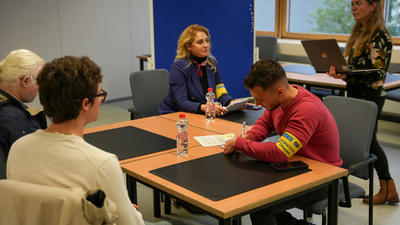-
Our work
-
Fields of work
- Arms control
- Border management
- Combating trafficking in human beings
- Conflict prevention and resolution
- Countering terrorism
- Cyber/ICT Security
- Democratization
- Economic activities
- Education
- Elections
- Environmental activities
- Gender equality
- Good governance
- Human rights
- Media freedom and development
- Migration
- National minority issues
- Policing
- Reform and co-operation in the security sector
- Roma and Sinti
- Rule of law
- Tolerance and non-discrimination
- Youth
- Field operations
- Projects
-
Meetings and conferences
- Summit meetings
- Review Conferences
- Ministerial Council meetings
- Plenary meetings of the Permanent Council
- Plenary Meetings of the Forum for Security Co-operation
- Security Review Conferences
- Annual Implementation Assessment Meetings
- Economic and Environmental Forum
- Economic and Environmental Dimension Implementation Meetings
- Human rights meetings
- Media conferences
- Cyber/ICT security conferences
- Conference of the Alliance against Trafficking in Persons
- Gender equality conferences
- Annual OSCE Mediterranean conferences
- Annual OSCE Asian conferences
- Partnerships
-
Fields of work
-
Countries
- All
-
Participating States
- Albania
- Andorra
- Armenia
- Austria
- Azerbaijan
- Belgium
- Belarus
- Bosnia and Herzegovina
- Bulgaria
- Canada
- Croatia
- Cyprus
- Czechia
- Denmark
- Estonia
- Finland
- France
- Georgia
- Germany
- Greece
- Holy See
- Hungary
- Iceland
- Ireland
- Italy
- Kazakhstan
- Kyrgyzstan
- Latvia
- Liechtenstein
- Lithuania
- Luxembourg
- Malta
- Moldova
- Monaco
- Mongolia
- Montenegro
- The Netherlands
- North Macedonia
- Norway
- Poland
- Portugal
- Romania
- Russian Federation
- San Marino
- Serbia
- Slovakia
- Slovenia
- Spain
- Sweden
- Switzerland – OSCE Chairpersonship 2026
- Tajikistan
- Türkiye
- Turkmenistan
- Ukraine
- United Kingdom
- United States of America
- Uzbekistan
- Asian Partners for Co-operation
- Mediterranean Partners for Co-operation
-
Structures and institutions
- Chairpersonship
-
Secretariat
- Secretary General
- Office of the Secretary General
- Conflict Prevention Centre
- Transnational Threats Department
- Office of the Special Representative and Co-ordinator for Combating Trafficking in Human Beings
- Office of the Co-ordinator of OSCE Economic and Environmental Activities
- Gender Issues Programme
- Opportunities for Youth
- Department of Human Resources
- Department of Management and Finance
- Office of Internal Oversight
- Documentation Centre in Prague
- Institutions
-
Field operations
- Presence in Albania
- Centre in Ashgabat
- Programme Office in Astana
- Programme Office in Bishkek
- Mission to Bosnia and Herzegovina
- Programme Office in Dushanbe
- Mission in Kosovo
- Mission to Moldova
- Mission to Montenegro
- Mission to Serbia
- Mission to Skopje
- Project Co-ordinator in Uzbekistan
- Closed field activities
- Parliamentary Assembly
- Court of Conciliation and Arbitration
- Organizational structure
- About us

Story
The blight of trafficking
- Date:
- Source:
- OSCE Secretariat
- Fields of work:
- Combating trafficking in human beings, Economic activities
The economic impact of drug trafficking
Illicit production and trafficking of drugs has become one of the most virulent problems for OSCE states. While the phenomenon itself has been the subject of extensive research and policy initiatives, the economic impact of drug trafficking has so far received comparably little attention. The economic effect of the illicit drug trade greatly differs between the OSCE States, but it is widely accepted that the economic fallout is especially high on the countries of transition.
"Only one per cent of the money [] spent by drug abusers is generated as farm income in developing countries", the International Narcotics Control Board recently pointed out. "The remaining 99 per cent of global illicit drug income goes to drug trafficking groups operating at various other points along the drug trafficking chain." Other data suggest that two-thirds of the profits gained in drug trafficking is reaped in developed countries, and only one-third in countries of transition.
On 17 and 18 March, the OSCE held an experts meeting in Tashkent, Uzbekistan, to shed more light on the economic consequences on the legal economy caused by the illegal drug production and trafficking networks. It also focused more strongly on the dire economic and social situation this produces in particular in transition countries.
"Too often the discussion about the illicit trade of drugs is reduced to the law enforcement elements", said Marcin Swiecicki, the Co-ordinator of OSCE Economic and Environmental Activities at the seminar. "The Tashkent seminar has shown a different perspective: the economic fallout of drug trafficking, and this not only in the producer but also the consumer countries".
Human trafficking - a modern blight
"Modern slavery" is what best describes another growing problem for many OSCE states, either as country of origin, transit or destination. This trade respect neither laws nor borders.
It deals in women cajoled by human smugglers into agreeing to dubious job offers which turn out to be prostitutions, or children sold by their families for "easy money" to survive to the next day.
Organized criminal networks see huge profits from trafficking thousands of people from countries in transition. Social inequalities, corruption and a demand for cheap labour in destination countries facilitate the operation of such networks while devastating national economies.
At the Porto Ministerial Council in December 2002, the 55 OSCE foreign ministers recognized the human suffering and the destabilizing effects caused by human trafficking and recommended that the Office of the Co-ordinator of OSCE Economic and Environmental Activities play an increased role in addressing all economic aspects of trafficking.
On 17 and 18 February, the OSCE organized a seminar that focused in particular on the economic impact of human trafficking. The experts gathered in Ioannina, Greece, discussed the root causes of trafficking from an economic perspective. They formulated a policy agenda that can be adopted by the OSCE participating States to combat this blight more efficiently.
The deadly trade in arms
Another urgent problem to be examined in Prague by the OSCE participating States is the smuggling of arms and light weapons. It is recognized that this deadly trade is the source of the majority of civilian casualties in conflicts throughout the world. As with human and drugs trafficking, the economic impact of this problem has so far not been researched extensively. However, ways to tackle the illegal arms trade more effectively were suggested at the OSCE seminar in Sofia, Bulgaria on 11 November 2002.
"Strengthening our own networks in areas like customs and police is of utmost importance", said Ambassador Leif Ulland from Norway, Special Adviser on arms trafficking. "Norway is convinced that the illicit transfer and trafficking of small arms has devastating consequences, from humanitarian to socio-economic and economic."
Solomon Passy, the Bulgarian Foreign Minister, outlined the grave consequences of trafficking for human resources and national investments and the links between trafficking in small arms and organized crime.
The keynote speaker, Dr. Peter Batchelor, Project Director of the Small Arms Survey Project in Geneva, underlined that most of the trade with small arms and light weapons started out legally, and that key elements for analyzing the economic impact of arms trafficking needed to include the research and analysis of corruption, government revenue and resources as well as its indirect impact on the economy.
The Economic Forum in Prague - 'joined-up thinking'
The three previous seminars suggested that relatively little is known about the overlap between types of trafficking - such as the symbiotic organized criminal networks and transportation aspects, as well as the undermining effects on the countries' economies.
This Economic Forum aims at concrete results for collaborative combat against all three forms trafficking. The focus will therefore be on the overlap between the various trafficking commodities from an economic point of view and the roles and responsibilities of the business community, the governments and the OSCE will be scrutinized.
OSCE Impact
Discover more stories about how the OSCE improves lives.

Story
How one training sparked Iceland’s largest anti-trafficking operation
3 December 2025
Office of the Special Representative and Co-ordinator for Combating Trafficking in Human Beings

Story
Combating Human Trafficking begins in the workplace
14 September 2022
Office of the Special Representative and Co-ordinator for Combating Trafficking in Human Beings